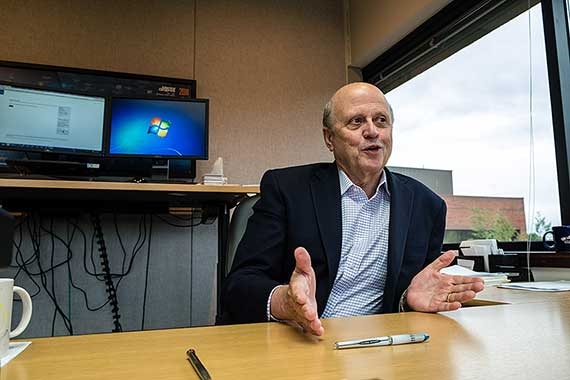In this interview excerpt, the 23-year veteran of Oregon’s largest software maker talks about activist investors and Measure 97.
I interviewed Rhines in his Wilsonville–based office yesterday for a Q & A to appear in our November issue. Coincidentally, the interview took place only few days after big news sent Mentor Graphics’ stock spiralling upward.
Last Friday, activist hedge fund Elliott Management announced more than an 8% ownership in Mentor Graphics. The company’s stock surged more than 7%, to around $26.48.
In regulatory filings, Elliott Management said, “there are numerous operational opportunities, including enhancing operational efficiency and revenue quality, as well as strategic opportunities for (Mentor) that would improve shareholder value.”
Mentor is no stranger to activist investors. In 2011 the company was sucked into a public proxy battle with well-known interventionist Carl Icahn, who at one time held 14.7% of Mentor Graphics’ shares.
In the following preview, Rhines responds to questions about Elliott Management and Measure 97.
OB: Are we bearing witness to another activist investor showdown?
WR: We have a long history of a diverse shareholder base. Elliot Management is a large shareholder. We listen to them, communicate with them. Many of them have ideas, it helps us keep in touch. We are not stranger of filers of 13D that openly express their desire to communicate their ideas to management. We’ve been involved before in this type of discussion; any actions are taken as a result by the Mentor Graphics board will be in the best interest of our shareholders, our customers and our employees.
[Schedule 13D is an SEC filing that must be submitted to the U.S. Securities and Exchange Commission within 10 days, by anyone who acquires beneficial ownership of more than 5% of any class of publicly traded securities in a public company.]
OB: Can you be more specific about the impact of the Elliott buy?
WR: We don’t give details of discussions of details with shareholders of any kind.
OB: The last Icahn investor stepped down from the Mentor Graphics board in February. How do you tell the story about Icahn today?
“Carl Icahn made a substantial investment in about 15% of our stock. He profited handsomely from that investment. Through board involvement he came to understand the strategy and reasons for why we do what we do. As far as I know he was a happy shareholder through most of his tenure with Mentor Graphics.” [In February Mentor Graphics announced it was repurchasing Icahn’s remaining shares.]
OB: What is your position on Measure 97?
WR: “It would be unfortunate for Oregon. It’s a sales tax, and even worse than a regular sales tax, it’s a compounded sales tax. It drives up expenses for our employees; it drives up expenses for Mentor Graphics because of having to buy from suppliers in Oregon. Government should live with its means, just like business has to live within its means. So it would be very unfortunate; it would be particularly hard on lower income people because groceries and basic necessities are very affected. All those prices would go up.
OB: Do you have an alternative revenue solution?
WR: I’m not in the business of prescribing how the state budget ought to be managed, just that Measure 97 is very bad thing for our employees and people of Oregon. And while it may be desirable over time to have a sales tax, this is a particularly egregious sales tax because of the compounding effect.”


